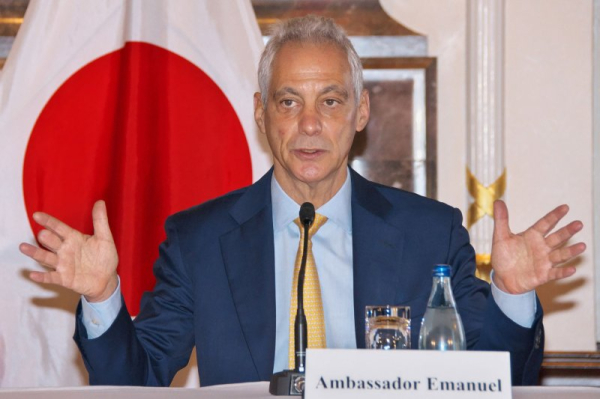
On Friday, U.S. Ambassador to Japan Rahm Emanuel (seen in 2023 at U.S. Ambassador’s Residence in Tokyo) instead will attend a different event to honor the Nagasaki atomic bomb victims at Zojoji temple in Tokyo’s Minato Ward, The Japan News reported. File Photo by Keizo Mori/UPI | License Photo
After Japan didn’t invite Israel to a Nagasaki ceremony over fears of possible protest disruptions, the U.S. ambassador is joining with many of his counterparts in skipping the event, as well.
U.S. Ambassador to Japan Rahm Emanuel this week will join multiple other nations’ ambassadors to Japan in skipping Nagasaki’s 79th annual memorial to mark the 1945 U.S. atomic bombing. Advertisement
Local officials did not invite an Israeli representative, voicing security concerns over possible protests spurred by the Gaza war.
“Given the critical humanitarian situation in Gaza and international opinion, there is a risk of unpredictable disruption occurring at the ceremony,” Nagasaki Mayor Shiro Suzuki explained on Saturday in regards to the decision by city officials to not invite Israel’s Ambassador Gilad Cohen to the anniversary ceremony.
Dignitaries from more than 150 nations and territories were among those invited to Nagasaki’s Friday ceremony on August 9 in southwest Japan to remember Aug. 9, 1945, the date when the United States dropped an atomic bomb on the Japanese city of Nagasaki. Estimates say anywhere from 40,000 to 74,000 people died in the event, which came three days after the United States leveled Hiroshima. Advertisement
British Ambassador to Japan Julia Longbottom said Tuesday that she, too, will skip the Nagasaki event, joining the ambassadors to Japan of Canada, France, Italy and Australia, according to reports.
On Friday, Emanuel instead will attend a different event to honor the Nagasaki atomic bomb victims at Zojoji temple in Tokyo’s Minato Ward, The Japan News reported.
Expected to sit in for Emanuel is Chuka Asike, principal officer at the U.S. Consulate in Fukuoka near Nagasaki, according to the sources.
Every year, city officials in Nagasaki send invitations to all embassies in Japan, but have excluded Russia and its neighboring Belarus since Moscow’s 2022 invasion began of Ukraine.
Nagasaki’s mayor first suggested publicly last month that Israel might be excluded from the 79th anniversary ceremonies, which prompted several countries, some now not attending the event on Friday, to send a letter to officials expressing their concerns over Suzuki’s comments.
“Should Israel be excluded, it would become difficult for us to have high-level participation in this event,” read a letter signed by representatives from Britain, Canada, France, Germany, Italy, the U.S. and the European Union.
Notably, however, the list of invitees also included China, Syria, Yemen, Venezuela, Myanmar and Afghanistan, all countries with known records of human rights abuses. And Iran’s ambassador was invited despite Iran’s designation as a primary sponsor of terrorism by the United States and its allies. Advertisement
Emanuel and Longbottom say Nagasaki’s decision not to invite Israel wrongly equates the war against Hamas in Gaza with Russia and Belarus’ actions with regard to Ukraine.
“Russia’s invasion of Ukraine and Israel’s self-defense is not morally equivalent,” Emanuel wrote in an email to The New York Times.
But Cohen, Israel’s ambassador in Tokyo, on Monday responded furiously to Nagasaki’s choice and was critical of officials’ reasoning.
“It has nothing to do with public order,” he told CNN. “I checked it with the relevant authorities that are responsible for public order and security, and there is no obstacle for me to go to Nagasaki,” Cohen said, accusing Suzuki of “inventing this.”
Suzuki, the son of atomic bomb survivors, expressed his desire for the ceremony to remain peaceful without a possibility of protests over Israel’s ongoing war in Gaza as the basis for not inviting Cohen to Nagasaki.
“We need to carefully monitor the situation as it develops,” he said, but reports say Suzuki did not specify any other details on terms, conditions or deadlines on a possible invite extension to Israel.
However, some critics say excluding Israel sends the wrong message, as Suzuki has stated he sent a letter in June to the Israeli Embassy in Tokyo, Japan’s capital city, calling for an immediate cease-fire in Gaza. Advertisement
Meanwhile, the Washington-based Council on American-Islamic Relations, America’s largest Muslim civil rights advocacy organization, was critical of the U.S. decision to reject the Nagasaki invite simply over Israel’s non-invite over Gaza.
“Instead of coming to the defense of a far-right genocidal government, our nation’s representatives around the world should embrace a universal standard of human rights and humanity that does not exclude the Palestinian people,” Ibrahim Hooper, CAIR’s national communications director, wrote in a statement while thanking Nagasaki officials for not inviting envoys of other nations’ to the ceremony currently engaged in alleged genocidal acts in violation of the Nuclear Non-Proliferation Treaty.
Even the Canadians for Justice and Peace in the Middle East organization voiced its outrage over the decision by Canada’s Ambassador to Japan Ian G. McKay to join Emanuel in not attending, calling it a “grotesque political stunt.”
“Boycotting the Nagasaki memorial service to protest the exclusion of Israel, a state which is actively committing genocide, is incredibly disrespectful to the civilian victims of mass killing in both Japan and Gaza,” Michael Bueckert, the group’s vice president, said.
He called it “absurd” that Canada is “standing up for Israel’s right to attend a memorial ceremony for the victims of the United States’ nuclear bomb on Nagasaki while its ministers casually call for dropping the same weapons on civilians in Gaza,” Bueckert said, adding his belief that Canada is demonstrating “that its priority is not a ceasefire but defending the sensibilities and reputation of a genocidal regime.” Advertisement